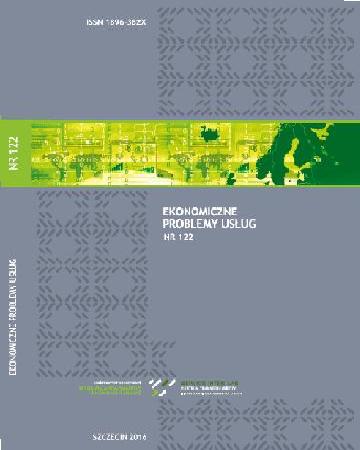
ISSN: 1896-382X
eISSN: 2353-2866
OAI
DOI: 10.18276/epu.2017.127-26



Issue archive /
nr 127 2017
Postrzeganie zjawiska wykluczenia finansowego przez młode pokolenie Polaków
(Perception of phenomenon of financial exclusion by young generation of Poles)
| Authors: |
Mirosław
Sołtysiak
Politechnika Rzeszowska Wydział Zarządzania Zakład Finansów, Bankowości i Rachunkowości |
| Keywords: | financial exclusion perception young generation |
| Data publikacji całości: | 2017 |
| Page range: | 13 (285-297) |
| Klasyfikacja JEL: | G20 G29 |
Abstract
The issue of financial exclusion has been the topic of scientific research for decades now. Each and every individual may become excluded with respect to an array of criteria, such as for instance educational background, income level, financial status, nationality or even a way of living. This means they are not allowed to perform certain social activities, even though they are both able and willing to undertake them. This unfavourable condition is usually caused by other people's reluctance.
The article addresses the issues of the perception of financial exclusion among young Poles by providing a survey 's outcome. Firstly, the awareness of financial exclusion problem among young people is presented. Secondly, the causes of the phenomenon are elaborated on, as well as types of individuals potentially endangered of such exclusion. Finally, the outcome of research is provided in terms of the evaluation of the phenomenon's range and identification of people in charge of counteracting it.
Download file
Article file
Bibliography
| 1. | Anderloni, L. (2007). Access to Bank Account and Payment Services. W: L. Anderloni, M.D. Bra¬ga, E.M. Carluccio (red.), New Frontiers in Banking Services. Emerging Needs and Tailored Products for Untapped Markets. Berlin, Heidelberg: Springer-Verlag. |
| 2. | Buko, J. (2011). Przeciwdziałanie wykluczeniu finansowemu jako element wspierania spójności spolecznej. Nierówności Społeczne a Wzrost Gospodarczy, 18, 268-278, |
| 3. | Czapiński, J., Panek, T. (red.) (2007). Diagnoza społeczna 2007. Warunki i jakość życia Polaków. |
| 4. | Warszawa: Rada Monitoringu Społecznego, Vizja Press & IT. |
| 5. | Financial Services Authority (2000). In or Out? A Literature and Research Review. Consumer Research, 3. |
| 6. | Financial Services Provision and Prevention of Financial Exclusion (2008). Brussels: European Commision. |
| 7. | Iwanicz-Drozdowska, M. (red.) (2011). Edukacja i świadomość finansowa. Warszawa: Oficyna Wydawnicza SGH. |
| 8. | Kazimierczak, T., Ryrnsza, M. (2005). Aktywna polityka społeczna. Stan obecny i szanse upo-wszechnienia koncepcji. Analizy i Opinie ISP, 48, 2-7. |
| 9. | Leyshon, A., Thrift, N. (1995). Geographies of Financial Exclusion: Financial Abandomment in Britain and United States. Transactions of the Institute of British Geographers, „New Series", 20. |
| 10. | Richardson, L., Le Grand, J. (2002). Outsider and Insider Expertive: The Response o/Residents of Deprived Neighborhoods to an Academic Definition of Social Exclusion. CASE Papers 57, London School of Economics, Centre for Analysis of Social Exclusion. |
| 11. | Weber, M. (2002). Gospodarka i społeczeństwo. Warszawa: PWN. |